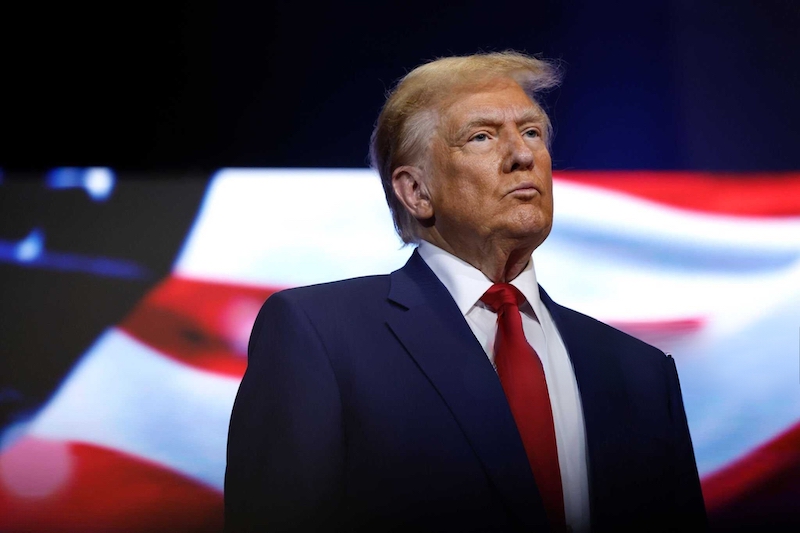
A federal judge issued a temporary injunction on Thursday, blocking President Donald Trump’s executive order that sought to redefine birthright citizenship. The ruling came after a hearing in which the judge deemed the order “blatantly unconstitutional.” The decision is part of an ongoing legal battle involving multiple states challenging the executive action.
The 14th Amendment of the U.S. Constitution guarantees citizenship to anyone born on American soil, a provision that was ratified in 1868 following the Civil War to ensure citizenship for former slaves. In an attempt to limit unlawful immigration, Trump signed the controversial order shortly after his second inauguration on Monday.
The executive order targets children born after February 19, whose parents are living in the U.S. illegally, denying them automatic citizenship. Additionally, it prohibits federal agencies from issuing any documentation or recognizing state-issued documents that would acknowledge such children as U.S. citizens.
The order immediately sparked legal opposition, with at least five lawsuits from 22 states and various immigrant rights groups. A joint lawsuit filed by Washington, Arizona, Oregon, and Illinois was the first to receive a hearing. U.S. District Judge John Coughenour, who has served on the bench for more than four decades, expressed strong skepticism about the order, calling it “blatantly unconstitutional.”
“I’ve been on the bench for over 40 years and I can’t recall another case where the issue was so clear-cut,” Coughenour said during the hearing, addressing a Justice Department lawyer.
Thursday’s decision prevents the administration from enforcing the order for a 14-day period while additional arguments are submitted. A follow-up hearing is scheduled for February 6 to determine whether the injunction will be extended as the case progresses.
Coughenour, 84, a Ronald Reagan appointee, also questioned the legal standing of the Department of Justice’s position. He specifically asked DOJ attorney Brett Shumate whether he personally believed the order was constitutional, to which Shumate affirmed it was. Shumate argued that the legal questions raised by the order had never been litigated and that the temporary restraining order was unnecessary given the short duration before the executive action would take effect.
In response to the ruling, the Department of Justice issued a statement saying it would “vigorously defend” the executive order, which it asserts “correctly interprets the 14th Amendment of the U.S. Constitution.” The statement further indicated that the department was eager to present a full merits argument to the court.
The U.S. is one of roughly 30 countries that apply birthright citizenship, or jus soli, most of which are in the Americas, including Canada and Mexico. The 14th Amendment’s Citizenship Clause, ratified in 1868, guarantees citizenship to anyone born or naturalized in the United States and subject to its jurisdiction. Trump’s order, however, contends that children of noncitizens, including undocumented immigrants, are not “subject to the jurisdiction” of the United States and thus do not qualify for automatic citizenship.
Lane Polozola, assistant attorney general for Washington, representing the states challenging the order, argued that the administration’s position was “absurd.” He pointed out that neither undocumented immigrants nor their children are exempt from U.S. law. Polozola also highlighted the immediate financial burdens the order would impose on states, which would need to overhaul systems for healthcare and other benefits to accommodate the new citizenship status of children born to undocumented parents.
“The order would strip citizenship from hundreds of thousands of people nationwide,” Polozola stated. “This is an urgent matter—babies are being born every day, and the states cannot wait while the court deliberates.”
Washington Attorney General Nick Brown emphasized that the case reflects a historical commitment to birthright citizenship, pointing to the Dred Scott decision of 1857, which held that African Americans were not citizens. He argued that the 14th Amendment, by contrast, “was designed to ensure that everyone born on U.S. soil is a citizen.”
The legal debate over birthright citizenship was notably addressed in the 1898 Supreme Court case United States v. Wong Kim Ark, which affirmed that a child born in the U.S. to Chinese immigrants was a citizen under the 14th Amendment. However, some proponents of immigration restrictions contend that this case applies only to children of legal immigrants, leaving questions about its applicability to children of undocumented parents.
The legal challenge to the executive order has resonated with personal significance for many involved. Connecticut Attorney General William Tong, who is the nation’s first Chinese American elected attorney general, noted that the issue was deeply personal for him. He expressed his belief that the judge’s decision was correct, asserting that “there is no legitimate legal debate” on the matter of birthright citizenship.
As this case unfolds, the battle over birthright citizenship remains a critical point of contention in the broader debate over immigration policy and the interpretation of constitutional rights.


















